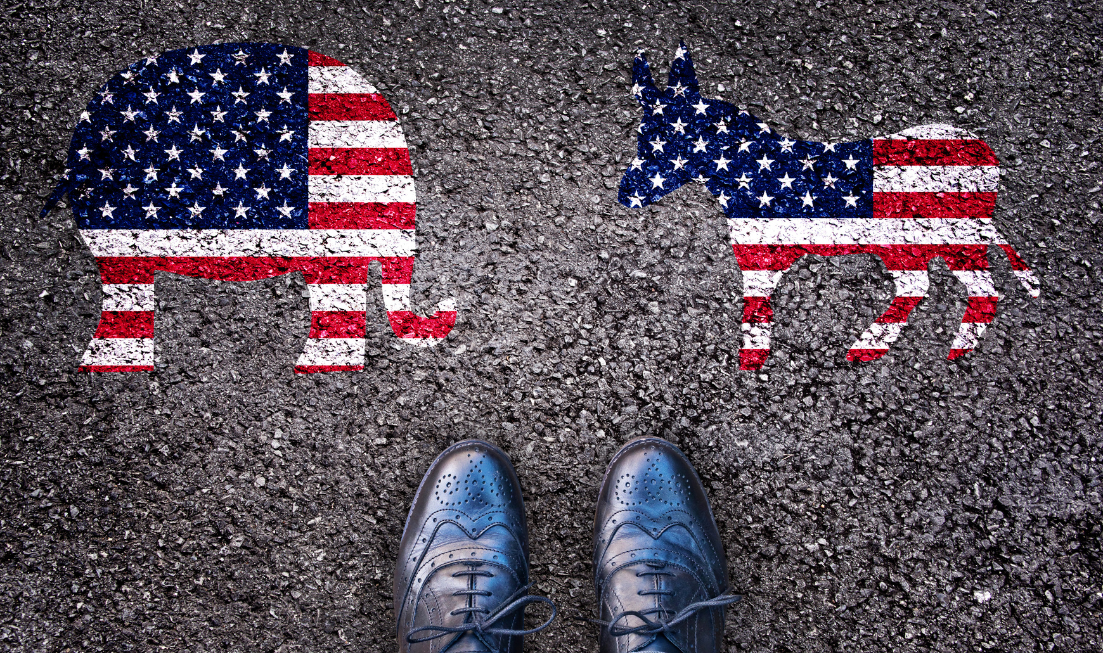Cult of personality, political violence and the U.S. election

Politics of grievances and polarization, focused on winning divisively, rather than governing, are part of the reason why acts of violence such as the apparent attack on Donald Trump are less surprising in today's political climate, Political Science professor Greg Flynn explains. (Adobe Stock image)
September 16, 2024
An apparent attempt to assassinate former U.S. president Donald Trump on Sunday – two months after he was shot at a rally — is distressing, but not necessarily surprising in today’s increasingly polarized and tense political environment, experts say.

Greg Flynn, assistant professor in the department of Political Science, explains the reasons for this shift, and explores its implications for elections in the U.S. and in Canada — and for democracy.
Are you surprised by the news of the apparent attempt on Trump’s life?
Any degree of violence towards a public figure is always shocking — one of those ‘you remember where you were’ kind of moments. But was it a surprise that someone would employ violence against a candidate for office in the United States? Not really.
There are three underlying reasons for violence to be more likely in our current environment than in the past:
The politics of grievance: Politicians appear to be increasingly willing to appeal to the worst in people. Rather than offer people hope or solutions, it has become easier and, quite frankly, more productive to pit people against one another or against the state.
Someone has to be blamed for why people’s lives are more difficult or tenuous and we see a corresponding “othering” of some nameless or faceless actor to be blamed rather than encouraging individual responsibility or accepting the reality of just plain difficult circumstances.
Whether it is gatekeepers, wacko politicians, illegal immigrants or bail jumping criminals, it is easier to point fingers than provide complicated (and in many cases, truthful) answers. The COVID-19 pandemic was a large part of this, but this assault on decency and truth was occurring well before 2020.
Extreme polarization and demonization of political opposition and the state: It has reached such a toxic level in the United States and in other countries that it might be more surprising that we have not seen some type of violence already.
And, in fact, we have: Whether it is the events of Jan. 6, 2021 or the COVID-19 convoy protests in Canada and the border blockage at Coutts, Alta., in particular, we should recognize that there is both real and attempted violence of a political nature already occurring.
When we talk about political opponents as enemies or traitors, or talk about stolen elections, it encourages people to think the worst of others and leads to the conclusion that the ends justify the means — that it is okay to use violence because the state and the others are unjustly oppressing “the people.”
The cult of personality: Political movements and party politics are so heavily focused on leaders. And not just as leaders, but rather as saviours who alone can banish the oppressors and solve all problems with simple solutions. It makes these people not just politicians, but celebrities, if not demigods.
What kind of impact do you think that could have? Could it encourage more violence as we approach the November election?
It would really depend on how you define political violence. If we mean voter intimidation, I think it is clear that is already happening on the ground, in communities and within families. There are multiple media reports of threats of violence if people vote in a particular direction. The destruction of lawn signs is just one example.
If we are talking about the use of state power to disenfranchise voters and communities, that too has already happened. Florida stands as a reprehensible example where efforts to stop individuals who have been incarcerated from voting, even after they have been released, is really just about disenfranchising an entire community and suppressing an historically oppositional voting class.
Do you think we are seeing echoes of this political tension in Canada?
We have already seen this play out in Canada. There may be a lot of reasons to dislike the Trudeau government, but the level of actual violence that has been threatened or employed against the current Prime Minister is, or at least should be, shocking.
We focus on the throwing of gravel at the Prime Minister during the 2021 election campaign and kind of brush off this seemingly and relatively innocuous event. However, it belies and is indicative of a much bigger political violence problem in Canada than we would like to admit. It isn’t so much the simple act of throwing stones at our leaders, but rather the mindset that says it is now okay to cross those lines.
And it is not just the threats to these individuals (not that we should downplay or forget that at any time), but also the larger impact it has on our politics and the ability to recruit well-meaning and highly talented people into public service. Who would bother?
This time in history feels particularly fraught/polarized. Is there anything to that? Or do you think this is business as usual when it comes to elections?
It is a particularly fraught time in our politics. A recent report indicated that the U.S. has not been this polarized since the end of the Civil War …. the civil war!
It comes from politicians and political strategists who are more focused on winning than on governing — that treat politics as a game to be played and that it is an acceptable strategy to divide populations into smaller and smaller groups of people and then cater to them with specific policies aimed at securing their votes.
The public good increasingly is eclipsed when politicians treat voters as consumers rather than citizens.
And until such time as voters reject this type of politics, and start looking beyond their own individual and selfish interests, and start looking at the broader good, there will always be someone willing to exploit those divisions.
In short, until we force the change, it is, sadly for our democracy, business as usual.


